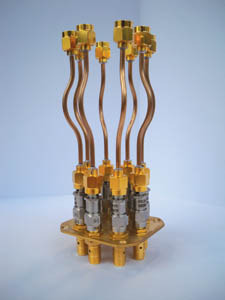by
Brendon Nafziger, DOTmed News Associate Editor | April 22, 2010

Wiring for the
cryogen-free, ultra-cooling
Triton 200 system.
(Image courtesy of
Oxford Instruments.)


Oxford Instruments picked up what the BBC calls the United Kingdom's "most prestigious business award" for a cryogen-free, ultra-low temperature refrigerator that could help develop next-generation quantum computers, the company announced Wednesday.
The Oxon-based developer earned a Queen's Award for Enterprise: Innovation, an annual award given by the Queen of England to promote UK business, for its Triton 200 system.
This is the 9th Queen's Award Oxford has won, CEO Jonathan Flint said in a statement.
LIQUID HELIUM-FREE COOLING
The Triton 200 is a dilution refrigerator integrated with a high-field superconducting magnet. A so-called "dry" refrigerator, the Triton doesn't require cryogens, made of liquid helium, to create super-cold temperatures. Instead, it relies on a pulse tube refrigerator run with electric power and water-cooling to cause temperatures to plunge down to 4 kelvins (-452.47 degrees Fahrenheit).
With an additional dilution refrigeration circuit using a helium 3 and helium 4 mixture, the fridge can drop temperatures to within a few thousandths of a degree above absolute zero.
"This is 1,000 times colder than outer space," Lynn Shepherd, a spokeswoman for Oxford, told DOTmed News.
Because its main design doesn't require liquid helium, an expensive substance, it could reduce costs by $15,000 a year for each system, according to Oxford.
Helium, which in its ultra-cold liquid form is used to freeze MRI magnets to make them superconductive, is being depleted. The only really energy-efficient way to acquire the element is to extract it from natural gas, a nonrenewable resource. And according to Wired magazine, some industry watchers estimate that "the Earth will be virtually helium-free by the end of the 21st century."
"Since helium is a finite resource this cost is increasing significantly with time," noted Shepherd.
QUANTUM COMPUTING, MEDICINE
Developed in partnership with Very Cold, an aptly named German company acquired by Oxford two years ago, the Triton 200 is used for fundamental physics research. Possible future applications include non-silicon-based quantum computing and quantum information processes. It could also help create extremely sensitive detectors for use in medicine or even airport security.
Oxford recently sold its 50th unit, said Shepherd. Customers include the U.S. universities Harvard, Princeton and Yale.
QUEEN'S FAVOR
The Queen's awards recognize British companies in three categories: innovation, international trade and sustainable development; there are also awards to individuals for enterprise promotion. Winners are entitled to use the award emblem for five years after earning it, and are invited to a reception at Buckingham Palace in July.
Oxford was one of 38 to receive an award for innovation this year, and 143 award winners overall.
Other businesses to nab the top prize include Concateno, which developed a saliva test for drugs used by police around the world, and Touch Bionics, which creates bionic hands and fingers. (See DM 10938.)


